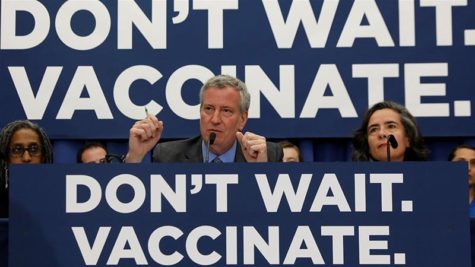
By: Savi Raghuraman | News Editor
April 12, 2019
An ongoing measles outbreak in New York caused the city’s mayor to declare a public health emergency last Tuesday. Along with the declaration, the government issued an order for mandatory vaccinations in parts of the city, including possible forced vaccinations and fines for people who disobey, causing immediate outcry from anti-vaxxer coalitions.

Mandatory vaccination rules are common. All 50 states require children in public school to be vaccinated. However, every state allows medical exemptions, and most states, although not California, allow religious exemptions. Meanwhile, this New York order is causing much more controversy because of its absolute terms, with the implication of forced vaccination for residents who do not comply. Medical exemptions are permitted, but not religious or philosophical exemptions. Plus, this law involves all residents, not just children who attend public schools.
The threat of a fine of up to $1,000 or being forced into vaccination has some Americans questioning the legality of the order. The only significant Supreme Court precedent for the constitutionality of mandatory vaccinations originated in 1905 in Jacobsen v. Massachusetts. The Court upheld the fining of Henning Jacobsen, a Massachusetts resident who refused to be vaccinated. The justices reasoned that enforcing a vaccine requirement was not too much of an infringement by states on individual freedoms considering the welfare of the larger community at stake. However, the majority opinion also stated that this enforcement could not include vaccination by force.
Many of anti-vaxxers’ arguments about the dangers of vaccines are false or overblown and lack scientific support, but there is some degree of relevance to the claim that the government should not intervene in personal medical choices. It’s an argument similar to that used by pro-choice advocates in the abortion debate, placing emphasis on a woman’s right to privacy in her personal health decisions. A person should not be forced to take anything into their bodies that they fully believe will hurt them.
The difference is that an individual’s choice to vaccinate or not vaccinate affects more than just that person. When around 95% of a population in a given area has been vaccinated for a particular disease, a protection called herd immunity is created, which means that one case of the disease cannot explode into a major outbreak because there are too few people who can catch and spread it. The youngest infants and some people with autoimmune conditions cannot be vaccinated for medical reasons, so they rely on herd immunity to keep from getting dangerously sick. When more healthy people opt out of vaccination, the remainder of the population is put in more danger of catching disease.
“The dilemma is whether to push personal freedoms or a greater good, and we need to find the middle ground,” sophomore Saran Raghuraman said. “Personally, I think that mandatory vaccinations, with religious exemptions, are a good thing, but it should be made known to those people that don’t vaccinate that their choices impact the lives of others.”
Besides the eternal balancing act of individual freedom versus community welfare, society must contend with the misinformation surrounding vaccines. If it weren’t for the growing percentage of people believing false claims about the dangers of vaccines, the order to forcibly vaccinate wouldn’t need to be considered at all, because herd immunity would be secure. Because vaccines are preventative rather than curative, the concrete benefits are not obvious to many people and they might not see the risks of not vaccinating until it’s too late.
“My grandpa had polio, and I still can see the effects on him, the emotional strain, so I feel strongly about vaccinations,” senior Macy Smith said. “I don’t want anyone else to go through what he did. But I respect the religious beliefs of others.”
There is no perfect solution to the vaccine debate. Nevertheless, the dilemma of whether to require vaccinations is privileged by its very existence. Truly, our country should be thankful to have such easy access to vaccines at all. Perhaps if we had more of a sense of life without vaccines, less incentives to vaccinate would be necessary.

Leave a Reply